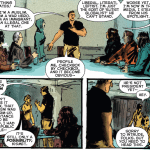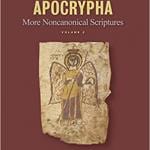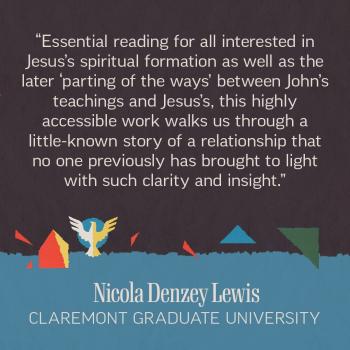I was incredibly excited when I saw that acclaimed journalist Ariel Sabar had a book coming out about the entire Gospel of Jesus’ Wife fiasco, scandal, hullabaloo, and whatever other terms may be needed to encapsulate the events that unfolded within as well as beyond academia. It brought me further delight when Sabar got in touch to say he would be sending me a copy. As you know, my blog was one of the places that there was frantic and I hope significant activity related to the topic. The fragment was a forgery, but that matter was settled by careful investigation. Those who dismissed it on the basis of a hunch or inclination did a disservice to scholarship even though they turned out to be correct, because scholarship is not a matter of whether you turn out to have been right but whether you follow essential procedures and engage in rigorous detailed analysis.
Sabar’s book is available today. The title is Veritas: A Harvard Professor, a Con Man and the Gospel of Jesus’ Wife. It covers the story that he documented so well in his famous article that unmasked the forger, but adds such an incredible amount of additional detail about everyone involved and the parts they played in the unfolding drama.
I asked Sabar some questions with a view to posting them this morning when the book became available to the public, to highlight why academics should read it, since I have no real doubt that the public in general will do so. Here are my questions and his answers:
What if anything did you learn as a journalist as a result of investigating this subject that connects directly with what academics do?
I guess the biggest takeaway, for me, is how foreign the work of provenance research is to many scholars, even to historians, who one imagines would care a lot about the character and credibility of sources. It may just be that journalists bring a different set of tools to such investigations. Or that we tend to deal with living sources rather than dead ones. Or maybe that we’re more temperamentally inclined to do things like scour public records, cold-call people, knock on strangers’ doors. It made me wonder whether training programs for scholars of art and antiquities should perhaps teach some of these shoe-leather techniques. Or perhaps bring in art crime experts and profilers who can talk about the MOs and psychological tricks of fraudsters. The fields of art, archaeology, and antiquity—where scholarly expertise has a kind of cash value—are, I would presume, particularly attractive to scammers. Finally, scholars should always feel free to reach out journalists who might be interested in looking into an object’s past as part of a story!
What if anything surprised you about academia and professors?
I’m the son of a professor of Near Eastern Languages, so have moved vicariously in the world of scholars my whole life. I love talking with smart people pushing the frontiers of knowledge. I know that academic politics in any field can be treacherous. But to me, as an outsider, there seems to be a special vitriol in certain debates in biblical studies. What’s at stake, it seems, isn’t simply knowledge for its own sake but at least in some ways the religious (or atheistic) convictions that many biblical scholars feel at their very core.
What advice do you have for professors and other academics as a journalist who has researched a subject that academics have also engaged with, and as the person who really provided the clearest and most important insights that helped settle the question of not just whether the “Gospel of Jesus’ Wife” was authentic, but who was behind the forgery?
See answer #1, above, for part of it. One scholar who had a measure of involvement in the GJW saga told me that if she’d had it to do over again, she would have convened a much wider group of experts before going public. Experts that weren’t necessarily friends or colleagues. Experts that hadn’t sat on one another’s dissertation committees. So that the exchange of views would be more dynamic and perhaps even more adversarial. As I report in the book, two of the lead scientists Dr. King recruited to test the papyrus had no prior experience in archaeometry. They also had conflicts of interest that neither Dr. King nor the scientists disclosed, either to the editors of the Harvard Theological Review or to the public.
What did you learn if anything as a result of taking the topic of your fascinating article and turning it into a book-length treatment? What emerges from writing a book about a subject that may not emerge in the process of writing an article (even when the article may be, as yours often are, long and detailed)?
One of the things you can do in a book is to rise above the narrative and try to reckon with the larger, philosophical questions the material asks. For me, those questions centered on the nature of truth and the different roads by which people seek it. Journalists are by profession and inclination empiricists. We believe in facts. We trust that interviews, document research, and investigation can turn up verifiable truths, or at least bring us closer to them. The deeply devout often set store by faith—a belief in things unseen, whether or not science can prove them. Postmodernists like King are skeptical of the very idea of facts. They believe that language creates the world, that whoever has the power to tell—and sell—the best story in effect creates reality.
What the end of the book wrestles with is what happens when those different ways of knowing collide? What happens when they collide within the same institution? Or even within the same person? That was one of the reasons for the title Veritas, which is meant to conjure more than just the Harvard motto. I think these questions are especially apt in our own historical moment, which has seen the rise of “alternative facts,” coordinated disinformation campaigns, and the idea, as one critic has put it, that “everything is possible and nothing is true.”
When I sent those questions I had pretty much just received my copy. But I had already read enough of the book (it is a page-turner) to be wowed, so that I was already looking forward to being able to blog about it and help to spread the word. Having read more of it now I can recommend it even more highly. I offer Ariel Sabar my congratulations on its publication, and thank him yet once more for the way he brought his incredible skill as an investigative journalist to bear on this important topic.
For academics, there is more in this book than just a fascinating narrative involving a deceiver, a lot of academics, the contribution of people not professionally in academia, and other players. I was particularly struck by Sabar’s treatment of the subject of certainty and objectivity, of postmodern openness to multiple narratives driven by power dynamics and the question of authenticity that seems to nonetheless have a single answer, yes or no (pp. 267-268). There are also details about other matters that are only indirectly related to the story of the Gospel of Jesus’ Wife, for instance about the Jesus Seminar and Polebridge Press that, will add to your knowledge as an academic things you probably don’t know unless you were directly involved. You’ll find it all fascinating and well worth reading.
See also Candida Moss’ article about the book, Mark Goodacre’s podcast review, and Brent Nongbri’s detailed first impressions on his blog.














